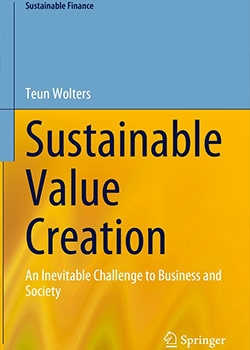Wittenborg Emeritus Professor Publishes New Book
Wittenborg Emeritus Professor Publishes New Book

New Extended Version of “Sustainable Value Creation” by Dr Teun Wolters Released by Springer Nature
Originally published by WUAS in 2013, the book “Sustainable
Value Creation” by Wittenborg Emeritus Professor of Applied Sciences Dr
Teun Wolters has brought out >a significantly revised and updated version, released by Springer Nature last July.
While
parts of the original book remain, Wolters has included recent
literature and new perspectives in the second version. The book has
eight chapters on different topics, such as the role of Chief Financial
Officers (CFOs) in sustainable business, sustainable supply chain
management, sustainability accounting, corporate governance and the
circular economy.
The Emeritus Professor says he was already working on the first version of “Sustainable Value Creation” when he joined Wittenborg. There, he developed the school’s MBA module on corporate sustainability. According to Wolters, writing the book helped shape the module.
“The first version of ‘Sustainable Value Creation’ was more of an elementary book to teach students the basic aspects of sustainability. But of course, as time passed, I gained more knowledge and insights and published more, so this follow-up is at a higher level of professionality and academic research. It gives a broad view of all the elements a company needs to consider to become a sustainable organisation.”
The author adds that the book's target audience comprises students, researchers, companies and professionals. “One of my core arguments is that CFOs and other financial professionals must be heavily involved in sustainability because, in quite a few companies, the financial staff will have a big say in the final decisions regarding investments. But the problem is that the models they use are often outdated if you think of what is needed for sustainability. So, the book calls for corporate financial officers and controllers to start playing a major role in leading a company towards being sustainable because if you do not invest in this area, that can endanger the company.”
The Need for a Well-being Economy
Additionally, “Sustainable Value Creation” is aimed at being a general treatise on sustainability. Wolters stresses that although significant theoretical and practical developments concerning sustainability have been achieved over the last decades, companies and society at large are still lagging behind.
“The concept of sustainable development was introduced by the United Nations’ publication ‘Our Common Future’ in 1987. It was an attempt to integrate development cooperation – which takes into account especially the needs of developing countries – with a better management of the environment, that is, in a sustainable way. Sustainable development became quite popular because it gave companies the argument that growth was still on the agenda, often forgetting severe caveats. But now the facts show that we need to depart from continuous, endless economic growth because of its ecological limitations.”

“The idea is that society needs to adopt healthy practises, even if they involve less or no economic growth. That could be, for example, investing less in transportation networks because you have more food or other items produced locally. This means less money earned but more welfare for people and benefits for nature. But there are also instances in which we must develop new products and services, and that could cause an increase in monetary income. In all cases, growth must be neither a priority nor a major indicator of success.”
Wolters highlights the importance of entrepreneurs for the well-being economy because, under the right ethical approach, and by employing ingenuity and creativity, they can offer innovations and solutions to major issues. He adds that when it comes to higher education, sustainability must be approached in an integral way so that students leave school with a solid knowledge of the subject.
“Although I support the idea of following the UN’s Sustainable Development Goals, there is the danger of a fragmented approach: when you take a few indicators, you may give a lot of attention to them and forget other crucial issues. So, we need an integral approach, ensuring that all students who leave school have a solid knowledge of sustainability because they are the future,” the emeritus professor concludes.
WUP 16/9/2023
by Ulisses Sawczuk
©WUAS Press
738 words